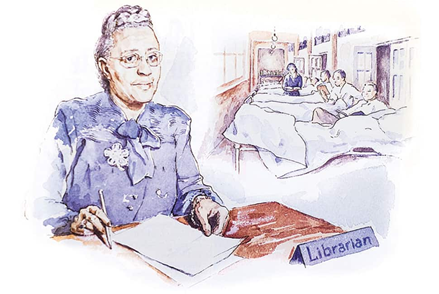Books have incredible power – and science confirms this. Love for Livres and their partners’ mission for the “Libraries of Emotions” project is to put this science in the hands of librarians and library users.
The power of books and reading to improve wellbeing is well documented* with the benefits falling in three main areas:
1. Improving our relationships with others
Reading helps to develop our empathy and emotional intelligence by allowing us to take a step back from our own situation and to view the world through another person’s eyes. This experience helps us to know ourselves better and to gain more self-confidence
2. Helping us to feel better
Reading helps to reduce our daily stress and is often a comfort in times of hardship. Reading before bedtime improves the quality of our sleep which has been a growing issue for many of us during lockdown. Most exciting of all, it allows us to use our imaginations to project ourselves into all types of futures.
3. Strengthening our cognitive capacities
Reading stimulates our brain, our memory, and our ability to pay attention. It develops our creativity and improves our ability to learn in new and different ways. Reading also helps to increase life expectancy and is important in fighting the effects of Alzheimer’s disease.
Books do not have all the answers, but they open doors in our minds and help us all to live a more fulfilled life.
This is not new!
Legend tells us that the Egyptian ruler Rameses II had inscribed on the pediment of his library The House that Cares for Souls. But it was Sadie Delaney Peterson who would become a pioneer of the bibliotherapy movement. Born in 1889 in Rochester, New York, this African American woman first trained as a social worker and then as a librarian in the 1920s.
Convinced of the benefits of reading, she developed methods of accompanying patients through books for some 30 years as head of the library at the Veterans’ Hospital in Tuskegee, Alabama. She was particularly involved with survivors of the First World War, people suffering from depression and blind people by learning Braille.
Following her, the Anglo-Saxon countries, notably the United States, Great Britain and Australia, appropriated these methods and adapted them in order to support vulnerable people and, later that century, the general public.

(Image by Mary Phelan)
*Sources :
- The Conversation, 15/11/2018 par Viacheslav Nikolaenko: Bibliotherapy: how reading and writing have been healing trauma since World War I.
- The Guardian, 05/11/028 par Arifa Akbar: If books can cure loneliness, why are we closing libraries?
- Le Monde du livre, 5/06/2013 par Léa Guidi: La bibliothérapie, pratique médicale méconnue en France.
- Terra Femina, 03/05/2016 par Anaïs Orieul: Les sept bienfaits insoupçonnés de la lecture
- The New Yorker, 9/06/2015 par Ceridwen Dovey: Can reading make you happier?
- Science, 18/10/2013 par David Comer Kidd et Emanuele Castano: Reading literary fiction improves theory of the mind.
